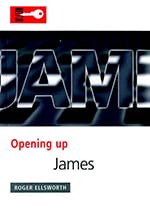
Paperback, 176 pages. Day One, Ryelands Road, Leominster, England HR6 8NZ. Price £6.00; ISBN 978-1846251658.
The author writes lucidly, divides up the letter helpfully, dealing with a section at a time and following each with relevant questions. His comments are generally helpful.
However, although this is basically an introductory book and one does not expect in-depth analysis, more explanation is needed at times. In considering the terms ‘word of truth’ and ‘engrafted word’ in James’ first chapter he does not identify them as the gospel, the message of salvation in Christ, and we are left wondering whether he sees them as the Old Testament or as including the Old Testament. In chapter 2 it is disappointing that the difference between the works of Abraham and Rahab and those envisaged in verse 8 is not discussed. This would help younger believers. The last verse of chapter 4 is ignored. In his comments on chapter 5 verses 14-15 he writes, ‘The New Testament ideal is a plurality of elders’, but he does not enlarge on his use of the word ‘ideal’. The clear parallels with the Lord’s teaching on the ‘Sermon on the Mount’ throughout this letter are barely noticed.
More seriously, there are two key areas where, in the reviewer’s mind, there are errors of interpretation. The first area is that of the law. He interprets the ‘law of liberty’, 2. 12, as the Mosaic Law. The writer then proceeds to confuse us by contradicting himself, ‘The purpose of God’s law is to convict us as transgressors’, and, ‘The laws of God were given to bring us into glorious liberty’, pages 85-86. New Testament teaching, especially Galatians, clearly shows that the law brought those under it into bondage; it is a ‘ministry of condemnation’, 2 Cor. 3. 9.
The second area is that of the last things. In his consideration of chapter 2 verses 12-13, he refers to the Day of Judgement which will involve all, including believers. He writes, ‘The authors of the Bible lived with constant and keen awareness of the reality of that day and we must do the same’. On that day we ‘will all fully realize our sins’. Is it not clear that God remembers our sins no more? Where is the blessed hope? The author also expounds the phrase ‘last days’ of chapter 5 verses 1-3 as the last days of the lives of the rich of verse 1; yet here is a reference to judgement.
Overall, I am unable to recommend this book.
[Our thanks to Bryan Charles, Appledore, Devon, UK, for this review]
| Cookie | Duration | Description |
|---|---|---|
| cookielawinfo-checkbox-advertisement | 1 year | Set by the GDPR Cookie Consent plugin, this cookie is used to record the user consent for the cookies in the "Advertisement" category . |
| cookielawinfo-checkbox-analytics | 11 months | This cookie is set by GDPR Cookie Consent plugin. The cookie is used to store the user consent for the cookies in the category "Analytics". |
| cookielawinfo-checkbox-functional | 11 months | The cookie is set by GDPR cookie consent to record the user consent for the cookies in the category "Functional". |
| cookielawinfo-checkbox-necessary | 11 months | This cookie is set by GDPR Cookie Consent plugin. The cookies is used to store the user consent for the cookies in the category "Necessary". |
| cookielawinfo-checkbox-others | 11 months | This cookie is set by GDPR Cookie Consent plugin. The cookie is used to store the user consent for the cookies in the category "Other. |
| cookielawinfo-checkbox-performance | 11 months | This cookie is set by GDPR Cookie Consent plugin. The cookie is used to store the user consent for the cookies in the category "Performance". |
| elementor | never | This cookie is used by the website's WordPress theme. It allows the website owner to implement or change the website's content in real-time. |
| viewed_cookie_policy | 11 months | The cookie is set by the GDPR Cookie Consent plugin and is used to store whether or not user has consented to the use of cookies. It does not store any personal data. |